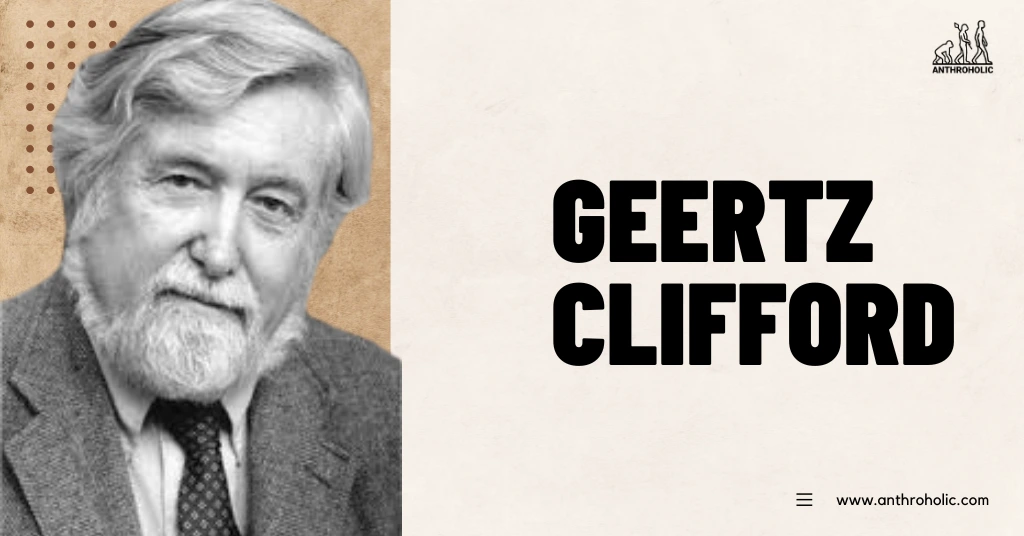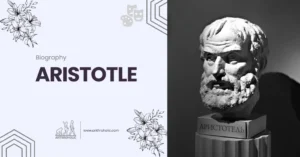AI Answer Evaluation Platform Live Now. Try Free Answer Evaluation Now
Geertz Clifford
One of the most influential anthropologists of the 20th century, Geertz Clifford is best known for founding interpretive anthropology, an approach that treats cultures as texts to be read rather than systems to be measured. His famous concept of “thick description” transformed ethnography from a science of structure into a search for meaning, emphasizing symbols, rituals, and stories as central to human life.

Geertz’s fieldwork in Indonesia and Morocco became the foundation for a body of work that crossed disciplinary boundaries, influencing not just anthropology, but history, literary criticism, political theory, and religious studies. His 1973 book The Interpretation of Cultures became a cornerstone text, with essays like Deep Play: Notes on the Balinese Cockfight becoming classics in both undergraduate classrooms and postmodern theory.
Rather than claiming scientific objectivity, Geertz embraced the complexity and subjectivity of cultural life. He believed that understanding a society meant learning to see the world from within its own symbolic logic.
Early Life and Education
Clifford James Geertz was born on August 23, 1926, in San Francisco, California. He came from a modest background and, like many of his generation, his early life was shaped by World War II. He served as a naval radio technician during the war, an experience that exposed him to global affairs but delayed his academic career.
After the war, Geertz enrolled at Antioch College in Ohio, a progressive liberal arts institution where he studied philosophy, literature, and social science. He showed an early interest in questions of meaning, narrative, and interpretation-interests that would define his anthropological vision.
Geertz then entered the newly established Department of Social Relations at Harvard University, an interdisciplinary program that combined psychology, sociology, and anthropology. There, he studied under key figures such as Talcott Parsons and Clyde Kluckhohn, absorbing ideas from structural-functionalism while also developing a critical distance from its abstract models.
Geertz earned his PhD in 1956, with a dissertation based on fieldwork in Indonesia-a project that would become the foundation of his academic reputation.
Early Career and Indonesian Fieldwork
Geertz’s first major ethnographic project took him to Java, Indonesia, in the early 1950s, where he conducted fieldwork on+, politics, and everyday life. He and his wife, Hildred Geertz (also an anthropologist), became part of a broader U.S. post-war initiative to understand non-Western societies during the Cold War.
In 1960, he published The Religion of Java, a detailed ethnography exploring the religious pluralism of Javanese society, where Islam, Hindu-Buddhist traditions, and animism coexisted and overlapped. The book was notable for its rich description of local beliefs and for treating religion as a cultural system of meaning, not merely a doctrinal or institutional framework.
This was followed by further research in Bali, where he famously described Balinese society as a “theatre state”-a society where power is enacted through ritual, drama, and symbolism rather than coercion. These early works revealed Geertz’s signature style: close attention to symbolic forms, deep contextualization, and a literary, almost poetic mode of ethnographic writing.
While other anthropologists sought to develop predictive models or causal explanations, Geertz was drawn to the interpretive, asking not what people did, but what their actions meant to them and to others.
By the early 1960s, Geertz had established himself as a leading cultural anthropologist, though his most influential contributions were yet to come.
Development of Interpretive Anthropology
In the 1960s and 1970s, Clifford Geertz began to articulate what would become his defining contribution to anthropology: the development of interpretive anthropology. Breaking from structural-functionalism and materialist approaches, Geertz argued that anthropologists should focus not on general laws or fixed systems, but on the interpretation of cultural meaning.
His approach was grounded in the idea that humans are symbolic animals, and that culture is best understood as a web of meanings that people themselves have spun. In this view, ethnography becomes not a scientific analysis of “how society works,” but an act of translation, where the anthropologist deciphers symbols, rituals, and actions the way a literary critic might analyze a poem.
His essay “Thick Description: Toward an Interpretive Theory of Culture” became the manifesto of this new direction. Borrowing the term from philosopher Gilbert Ryle, Geertz emphasized the need for contextual depth-for understanding not just what people do, but why it matters within their cultural world.
A classic example of this approach appears in his most famous essay, “Deep Play: Notes on the Balinese Cockfight” (1972), where he interprets the cockfight not as mere entertainment or gambling, but as a ritual dramatization of Balinese social structure, masculinity, and status anxiety. The essay exemplified his literary style and interpretive depth, and remains one of the most cited texts in cultural anthropology.
Major Works and Theoretical Contributions
In 1973, Geertz published The Interpretation of Cultures, a landmark collection of essays that solidified his reputation as one of anthropology’s leading theorists. The book outlined his vision of culture as a semiotic system-a set of shared symbols and meanings that people use to make sense of the world.
He famously wrote:
“Man is an animal suspended in webs of significance he himself has spun, I take culture to be those webs.”
Geertz’s anthropological vision was humanistic, literary, and philosophical. Rather than seek objectivity, he leaned into the subjectivity of the ethnographer, arguing that all knowledge is partial and situated. His work became central to the “interpretive turn” in the humanities and social sciences.
Other influential works include:
- Islam Observed: Religious Development in Morocco and Indonesia (1968) – comparative exploration of Islam as a cultural system
- Local Knowledge: Further Essays in Interpretive Anthropology (1983)
- Works and Lives: The Anthropologist as Author (1988) – a critical reflection on writing, authority, and ethnographic voice
Geertz’s writing also helped anthropology gain relevance in history, literary criticism, religious studies, and political theory, as scholars increasingly embraced meaning, narrative, and culture as central to social life.
Academic Career and Institutional Influence
Geertz held faculty positions at several prestigious institutions, including the University of Chicago, where he worked with fellow interpretivist anthropologists, and later at the Institute for Advanced Study in Princeton, where he remained for the rest of his career.
At Princeton, Geertz interacted with major figures in philosophy, history, and the humanities, helping to bridge disciplinary divides. His work was part of a broader intellectual movement that redefined the boundaries between social science and humanistic interpretation.
He was awarded numerous honors, including memberships in the American Academy of Arts and Sciences and the National Academy of Sciences, and received honorary degrees from universities around the world.
Though his interpretive approach was critiqued-especially by postmodernists and political anthropologists who questioned its politics, power dynamics, and focus on elites-Geertz’s emphasis on meaning, context, and narrative remains foundational to contemporary anthropology
Conclusion
Clifford Geertz reshaped the field of anthropology by turning its gaze inward-not only toward symbols, rituals, and meanings, but also toward the act of interpretation itself. He believed that understanding another culture required more than observing behavior or identifying structures-it required grasping the stories people tell about themselves, and how those stories give shape to their world.
Through his eloquent and philosophically rich essays, Geertz helped move anthropology from a discipline rooted in models and systems to one engaged with narrative, language, and semiotics. His concept of thick description transformed ethnography into a literary and interpretive art form, opening space for anthropologists to explore ambiguity, subjectivity, and cultural depth.
Geertz’s influence extended far beyond anthropology. His writings helped define the interpretive turn in the humanities, influenced the rise of cultural studies, and encouraged disciplines from history to religious studies to political theory to consider culture not as background noise, but as the primary terrain of meaning-making.
Though later scholars have critiqued aspects of his work-its focus on elites, its sometimes apolitical stance, or its literary abstraction-his impact remains profound. In a world increasingly shaped by symbolic power, identity politics, and cultural misunderstanding, Geertz’s core insight still resonates: that to understand others, we must read their worlds carefully, patiently, and from within.
References
- Clifford Geertz: Life – Institute for Advanced Study
Overview of Geertz’s academic journey and his role at the Institute for Advanced Study.
https://www.ias.edu/geertz-life - Clifford Geertz | Cultural theorist, Interpreter of cultures – Britannica
Summary of Geertz’s work and influence in cultural anthropology.
https://www.britannica.com/biography/Clifford-Geertz - Pioneering anthropologist Clifford Geertz dies – Princeton University
Obituary highlighting Geertz’s contributions and his association with Princeton.
https://www.princeton.edu/news/2006/10/31/pioneering-anthropologist-clifford-geertz-dies - Thick Description: Toward an Interpretive Theory of Culture – PhilPapers
PDF of Geertz’s seminal essay introducing the concept of “thick description.”
https://philpapers.org/archive/geettd.pdf - Clifford Geertz – The University of Chicago Press
Information on Geertz’s publications and his association with the University of Chicago.
https://press.uchicago.edu/ucp/books/author/G/C/au5838212.html - Clifford Geertz – New World Encyclopedia
Biography emphasizing Geertz’s educational background and anthropological contributions.
https://www.newworldencyclopedia.org/entry/Clifford_Geertz - Clifford Geertz – The Guardian
Obituary reflecting on Geertz’s influence and key works.
https://www.theguardian.com/news/2006/nov/15/guardianobituaries.obituaries




